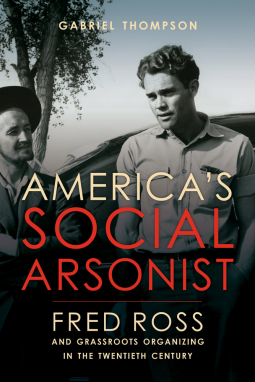
America's Social Arsonist
Fred Ross and Grassroots Organizing in the Twentieth Century
by Gabriel Thompson
This title was previously available on NetGalley and is now archived.
Send NetGalley books directly to your Kindle or Kindle app
1
To read on a Kindle or Kindle app, please add kindle@netgalley.com as an approved email address to receive files in your Amazon account. Click here for step-by-step instructions.
2
Also find your Kindle email address within your Amazon account, and enter it here.
Pub Date Mar 29 2016 | Archive Date Apr 13 2017
Description
Raised by conservative parents who hoped he would “stay with his own kind,” Fred Ross instead became one of the most influential community organizers in American history. His activism began alongside Dust Bowl migrants, where he managed the same labor camp that inspired John Steinbeck’s The Grapes of Wrath. During World War II, Ross worked for the release of interned Japanese Americans, and after the war, he dedicated his life to building the political power of Latinos across California. Labor organizing in this country was forever changed when Ross knocked on the door of a young Cesar Chavez and encouraged him to become an organizer.
Until now there has been no biography of Fred Ross, a man who believed a good organizer was supposed to fade into the crowd as others stepped forward. In America’s Social Arsonist, Gabriel Thompson provides a full picture of this complicated and driven man, recovering a forgotten chapter of American history and providing vital lessons for organizers today.
Advance Praise
“Fred Ross Sr. was one of America’s leading labor organizers and educators, dedicating his life to lifting the voices and earnings of the oppressed. Here’s a superb biography and introduction to Ross’s life, thoughts, teachings, and techniques—as applicable for America today as they were when he was alive and kicking.”—Robert B. Reich, Chancellor’s Professor of Public Policy, University of California, Berkeley, and former U.S. Secretary of Labor
“Fred Ross was a quiet leader who inspired greatness in those he met and worked with. He had real insight and knew how to move people to action. Cesar Chavez himself got his first organizing instructions from Fred Ross.”—Jerry Brown, thirty-ninth governor of California
“A compulsive read, full of keen social insights, sage historical judgments, and a telling narrative of a man who sacrificed family for the good fight. By rescuing Ross from obscurity, Thompson offers twenty-first-century social arsonists essential lessons that cannot be ignored even in an age of social media and capitalist hegemony.”—Nelson Lichtenstein, coeditor of The Port Huron Statement: Sources and Legacies of the New Left’s Founding Manifesto
“A superb, revelatory biography not only of the legendary Fred Ross but also of the rank-and-file activists in the barrios and fields whose heroic persistence made possible the rebellions of the 1960s.”—Mike Davis, author of City of Quartz: Excavating the Future in Los Angeles
“This compelling biography chronicles how previously powerless farmworkers were brilliantly organized by the charismatic Fred Ross. With painful honesty, it also documents Ross’s sacrifice, personal pain, and loss to himself and to his loved ones involved in this campaign across a lifetime of heroic effort.”—Kevin Starr, author of the Americans and the California Dream series
Available Editions
| EDITION | Other Format |
| ISBN | 9780520280830 |
| PRICE | $29.95 (USD) |
Links
Featured Reviews
 Reviewer 153322
Reviewer 153322
The title deserves an explanation: Fred Ross was referred to as an activist who went around the country setting other people on fire to campaign for their civil rights. Thompson reconstructs the life of an instrumental but far lesser known figure, whose conscious decision to remain behind the scenes is a model for organizing. As a young WASP in the 1930s, he was staggered by seeing the depression, and found his metier administering a housing camp for dustbowl migrants, then an internment camp for Japanese-Americans, then a program for Japanese-Americans cleared to leave the camps and find jobs in war industry. In each case, his strength was in recognizing leaders of the minority community (his work in northern California crossed paths with Cesar Chavez and Dolores Huerta whom he immediately began promoting as rising leaders), using his status with the worst of the establishment, but supporting the community itself to make their own decisions and demand desegregation of LA schools, better pay and conditions for farm workers and access to the vote. Thompson doesn't shy away from Ross' tragic personal life--being 110% for a cause leaves little for your family or your own health, and the author's role as a Steinbeck Fellow at San Jose add special resonance to this work.




